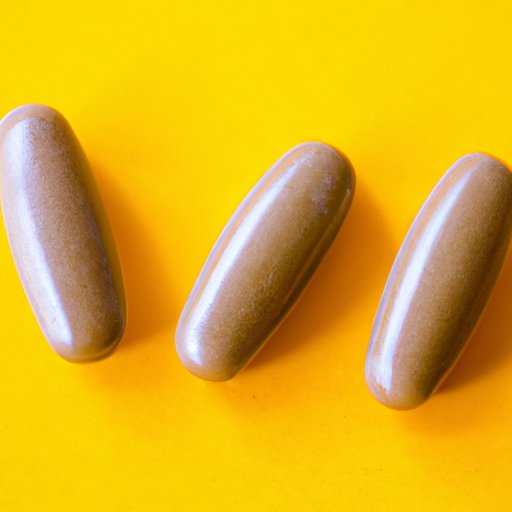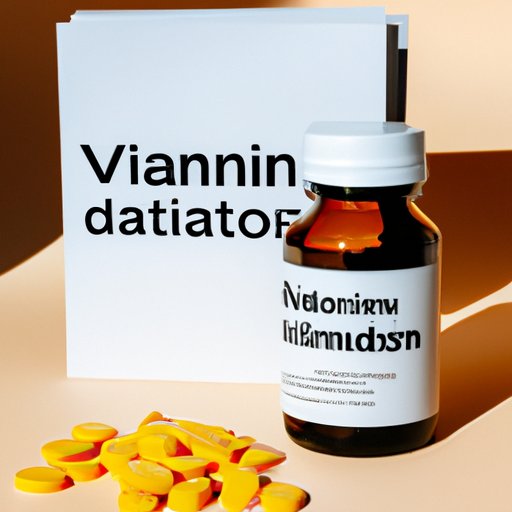
I. Introduction
Are you one of the many people who take vitamin D supplements? Have you ever wondered if it’s better to take it with or without food? Despite its prevalence, there is still confusion around what’s best for optimal absorption and usage of vitamin D. In this article, we explore the debate around whether vitamin D should be taken with food and why it matters for your health.
II. Benefits of Taking Vitamin D with Food
Research has shown that taking vitamin D with food enhances absorption rates. Since vitamin D is fat-soluble, it needs to be absorbed with dietary fat. When taken with food, vitamin D is absorbed better in the body compared to when taken on an empty stomach.
In addition to better absorption rates, taking vitamin D with food has also been linked to boosting immunity. Studies have found that vitamin D helps activate immune system cells, which work to fight off bacteria and viruses in the body.
III. The Debate Over Vitamin D Supplementation
There is no consensus on whether vitamin D supplements should be taken with or without food. Some experts argue that taking vitamin D on an empty stomach allows it to be absorbed more efficiently into the bloodstream. They believe that food could interfere with the absorption of vitamin D. However, others argue that taking vitamin D with food leads to better absorption and has no negative effects on nutrient uptake.
Despite the controversy, evidence suggests that taking vitamin D with food does enhance absorption and offers other health benefits, making it a smart choice for most people.

IV. Beyond the Label: Why Taking Vitamin D with Food is More Than Just a Recommendation
Taking vitamin D with food is more than just a recommendation on the label – it’s a critical component of getting the most out of this essential nutrient. By consuming vitamin D with dietary fat, you can increase the likelihood of optimal nutrient uptake.
In addition to the fat content of food, the type of food you eat can have an impact on how well your body absorbs vitamin D. For example, consuming fortified foods or items naturally high in fat, such as salmon or avocado, can help boost the absorption of vitamin D.
V. Unveiling the Truth About Vitamin D Absorption
Understanding how the body absorbs vitamin D is essential to maximize the benefits of supplementation. When you take vitamin D, it gets absorbed in your small intestine, where it’s metabolized and transported to your liver. From there, it’s converted into a biologically active form that can be used throughout the body.
Since vitamin D is a fat-soluble vitamin, it needs to be absorbed with dietary fat. Eating food with your vitamin D supplement provides the necessary fat for it to be absorbed in the body.
VI. Maximizing the Benefits of Vitamin D
If you’re looking to maximize the benefits of vitamin D, there are a few simple ways to incorporate food with your supplementation. Consider taking your vitamin D supplement with a small meal, such as a handful of nuts or a spoonful of nut butter. Alternatively, add foods naturally high in vitamin D, such as fatty fish or mushrooms, to your diet to optimize nutrient intake.
It’s also important to follow recommended dosage instructions for vitamin D supplementation. Taking too much vitamin D can lead to toxicity and other negative side effects, so it’s essential to follow recommended dosages and guidelines provided by your healthcare provider.
VII. The Science Behind Vitamin D and Food
The relationship between vitamin D and food is synergistic. Taking vitamin D with dietary fat helps facilitate nutrient absorption, while food can impact the body’s ability to use vitamin D effectively. For example, consuming high levels of caffeine or alcohol can interfere with calcium absorption, which in turn affects vitamin D utilization.
Furthermore, research has shown that consuming vitamin D as part of a balanced diet can help improve overall health outcomes, such as reducing the risk of certain diseases and boosting immune function.
VIII. Conclusion
When it comes to taking vitamin D supplements, there is still some debate around whether you should take it with or without food. However, research suggests that taking vitamin D with food enhances absorption rates and offers other health benefits, making it a smart choice for most people.
Remember, before making any changes to your vitamin D regimen or starting a new supplement, it’s always best to consult with your healthcare provider. They can provide tailored advice and guidance based on your individual needs and health status. Taking vitamin D with food may be a small change in your routine, but it can have significant positive impacts on your overall well-being.





